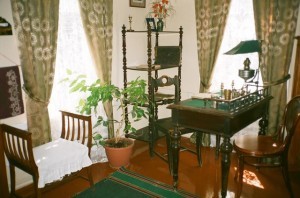Alison Anderson's Blog, page 3
October 15, 2010
Christian Bobin: A Little Party Dress & I Never Dared Hope for You

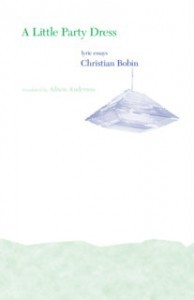 Christian Bobin deserves to be better known outside of France…his is a voice of serenity, thoughtfulness, calm in a hurried world. Neither poetry nor prose, “lyric essays” that make you stop and think and remember why you’re here. My own personal favorites; translating Bobin is an act of love.
Christian Bobin deserves to be better known outside of France…his is a voice of serenity, thoughtfulness, calm in a hurried world. Neither poetry nor prose, “lyric essays” that make you stop and think and remember why you’re here. My own personal favorites; translating Bobin is an act of love.
September 16, 2010
A Novel Bookstore by Laurence Cossé
 A literary thriller about the ideal bookstore…that is too controversial for the commercial powers-that-be. It makes you want to spend the rest of your life reading all the great books that are out there.
A literary thriller about the ideal bookstore…that is too controversial for the commercial powers-that-be. It makes you want to spend the rest of your life reading all the great books that are out there.
And it has its own website: www.thegoodnovel.com
Nominated for the Florence Gould French American Foundation Translation Prize 2011.
June 16, 2010
Sumy and the Chekhov Museum
 I’ve never been one for pilgrimages, or trips organized around a certain goal, or travelling for the sake of getting somewhere; I’ve always been, rather, something of a drifter, choosing my restaurants and lodgings and sometimes even villages or islands on a whim, an instinct, a desire to flee the crowds and insinuate myself into a landscape not as a tourist, but as a visitor or traveller.
I’ve never been one for pilgrimages, or trips organized around a certain goal, or travelling for the sake of getting somewhere; I’ve always been, rather, something of a drifter, choosing my restaurants and lodgings and sometimes even villages or islands on a whim, an instinct, a desire to flee the crowds and insinuate myself into a landscape not as a tourist, but as a visitor or traveller.
For the first time in many years at the end of May I broke my own self-imposed travel formula by joining a tour of Crimea that focused on the life of Anton Chekhov and the years he spent in Yalta and its surroundings, led by a congenial Chekhov scholar and followed by an equally congenial mixture of people of all ages and backgrounds who had one thing in common: a love of Chekhov’s work and a curiosity about the world he lived in, some of which, we discovered, is still very much alive in its way. The tour came about as part of a campaign to save Chekhov’s “White Dacha” in Yalta, where he lived the last years of his life, and which has been suffering from a severe lack of funding since the collapse of the Soviet Union. The campaign, based in Great Britain with both Chekhov scholars and admirers and theatre people behind it, is raising funds for vital repair and maintenance on the Dacha (see Yalta Chekhov Campaign.) (My fellow participants from the tour know who they are and I won’t go into a lengthy description of this part of the trip here but, rather, also provide other readers with the link to the excellent agency in Britain that organized the tour and encourage anyone who’s interested to write and enquire about subsequent tours…) What I did promise however to my fellow travellers was a description of the trip that I went on after I left them, where I journeyed by rail overnight across nearly all of Ukraine from the south due north to the town of Sumy, where Chekhov spent two summers as a young man, before he became the famous playwright we all know from the portraits with his pince-nez…
My interest in the Sumy summers came from Chekhov’s own descriptions in his letters. He was twenty-eight years old, unmarried, with a family who were both a great support and a considerable burden: the best way to please everyone and stay cool, literally, was to get out of Moscow for the summer and rent a dacha on a country estate. The estate was Luka, a few miles outside of Sumy; in those days Ukraine was part of the Russian empire and this was a lush, verdant landscape of gentle hills and winding rivers… The family who owned the estate were the Lintvaryovs: mother, three daughters, two sons. The two families became instant friends and their own friends and acquaintances drifted in and out of the main house or the dacha as the summers progressed; there was fishing and swimming, music and recitals, not to mention conversation…There were dramas, including a birth, a marriage, a death, and not a few affairs of the heart. Chekhov describes his time there better than anyone else could; my own interest is in the Lintvaryov family and their interaction with their soon-to-be-famous summer guest. I wanted to see—as in Yalta—what was still alive of that time.
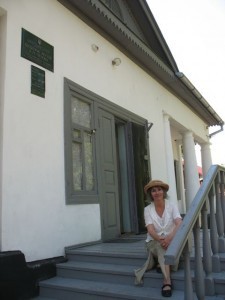 In 1960, the centennial of Chekhov’s birth, a small museum was created in the building that had been the summer dacha; from 1919 until then the estate had served as a school. The dacha-museum is well-kept and visited regularly, despite the loss of Soviet funding. I was a bit of an oddity there, as a foreigner; nearly all the visitors, I was told, were Ukrainian and Russian. The day I visited I joined the tour of a small group of medical students from Sumy, which seemed appropriate…
In 1960, the centennial of Chekhov’s birth, a small museum was created in the building that had been the summer dacha; from 1919 until then the estate had served as a school. The dacha-museum is well-kept and visited regularly, despite the loss of Soviet funding. I was a bit of an oddity there, as a foreigner; nearly all the visitors, I was told, were Ukrainian and Russian. The day I visited I joined the tour of a small group of medical students from Sumy, which seemed appropriate…
There are five rooms open to the public: the entrance is a display room with photographs and historical information, a few precious artefacts like Olga Knipper’s evening bag and one of Anton Pavlovich’s pince-nez, donated by his sister. The first room to the left is devoted to Chekhov’s brother Nikolai, who died of tuberculosis the second summer and is buried in the local cemetery. Behind that room, overlooking the garden to the rear, is where Anton Pavlovich stayed; a simple reconstruction of the way the room must have been, with a writing desk by the window, a day bed in the corner, and a small table with medical instruments that were of great interest to my fellows on the tour. The other room to the right of the entrance was where Chekhov’s mother stayed, and directly opposite the entrance was a dining room with a piano where the family entertained.
That’s a rather dry description of a place that in fact is very much alive, full of the spirit both of the era—thanks to a tasteful arrangement of antiques that had belonged either to the Lintvaryovs or to Chekhov’s sister Masha, or were donated by well-wishers—and of the writer himself. Like my companions in Crimea, the women who look after the museum in all senses of the term—Lyudmila Nikolayevna, the curator; Anna the guide, Alla the caretaker—share an ongoing love of Chekhov’s work and a curiosity in those who come to visit. They refer to their famous ghost, in fact, as Anton Pavlovich, as if he had merely gone down to the river to fish for a while and would be back after sunset with a basketful of crayfish… 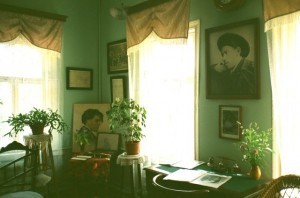
They are also very proud of their literary club, which meets at the museum for recitals, lectures, and performances. This is how we keep the intellectual life of the city alive, said Lyudmila Nikolayevna; our local intelligentsia is continuing the tradition begun here so long ago. They adopted me, when they found out how far I had come, and why I was there. I was taken to the back room (which had been Masha’s, and will again be someday soon) and plied with tea and biscuits and questions and more information than my poor head could retain; thankfully there are small guidebooks available and my old camera cooperated.
But for every painstakingly preserved teacup or garden hat or desk lamp in the Chekhov museum, there is an indescribable quantity of elegiac emptiness and absence in the old house across the street that had once been the Lintvaryovs’, a crumbling old brick building where the regulation waist-high green paint of its last incarnation as a school is still visible on the walls through the gutted windows. The school was closed in the early 1990s: the building that had survived two world wars, a revolution, Nazi occupation, the Red Army and hordes of schoolchildren has not survived twenty years of tight-fisted capitalism. Efforts to raise funds or interest the government have failed, thus far; Lyudmila Nikolayevna said even an article in the New York Times was unable to rouse any emigrant, or other, philanthropists from their apathy.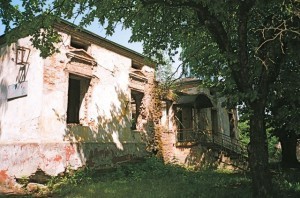 Anton Pavlovich, in one of his letters, mentions his desire to create a writers’ colony in Ukraine…the old Lintvaryov estate would have been the perfect place.
Anton Pavlovich, in one of his letters, mentions his desire to create a writers’ colony in Ukraine…the old Lintvaryov estate would have been the perfect place.
Although I am not altogether sure it is what Anton Pavlovich would have wanted in the end, in this day and age. Too much of present-day writing—or being a writer—is about being published, getting in print, being picked up by the media—all things Chekhov avoided and disliked in his lifetime. Still, if it were to save the Lintvaryov estate, and the memory of the people who created such a wealth of memories and happiness for Chekhov in his youth…it might not be too high a price to pay after all. Certainly there is something there of the summers of 1888-1889, still: the river for fishing, picnics, swimming and swinging out on “tarzanka” lianas; the bucolic village of Luka, with its country church and jovial priest. The local people of Sumy do not mind that they are so far from the cultural centres of the world; they know what they have to be proud of. Anton Pavlovich wrote, in one of his letters, “Abbazia and the Adriatic are marvellous, but Luka and the Psyol are better.” His descriptions are filled with the nostalgia of knowing a privileged moment of youth that is all too evanescent; something of his Luka lingers not only in his stories and plays, but also in present-day Sumy. 
April 17, 2010
Quiet Sky
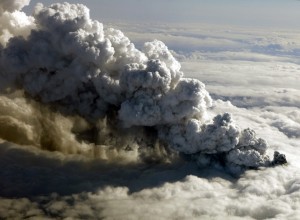 I live under the flight path for Geneva airport. Planes coming from the west fly as far as the beacon in the lake that sits a short ways offshore from the village of St-Prex, an ugly white cylinder in the idyllic lakeside scenery; I hear the shift in the sound of the jet engines as they make their turn, almost above my head. It’s not too loud, they’re still ten minutes away from landing, but with binoculars you can identify the type of plane, the carrier. It’s a regular, rhythmic, almost reassuring sound to everyday life:Â planes in the sky, all is as it should be.
I live under the flight path for Geneva airport. Planes coming from the west fly as far as the beacon in the lake that sits a short ways offshore from the village of St-Prex, an ugly white cylinder in the idyllic lakeside scenery; I hear the shift in the sound of the jet engines as they make their turn, almost above my head. It’s not too loud, they’re still ten minutes away from landing, but with binoculars you can identify the type of plane, the carrier. It’s a regular, rhythmic, almost reassuring sound to everyday life:Â planes in the sky, all is as it should be.
I came home from lunch with a friend today to find my neighbors sitting on the lawn; spring weather seems to be here at last after bitter cold winds and cloudy skies for days and days. I joined them; a bottle of wine and three glasses appeared, and we all commented how peaceful it was without the planes, how nature was forcing us to appreciate a different rhythm.
From time to time a small biplane flew overhead, almost defiantly, even though Swiss airspace is closed; he was small and surely below the infamous cloud of ash; the plane was red, and my neighbor called him the Red Baron.
I have a plane ticket to London, due to depart in two days’ time. When I booked it I regretted it was so much cheaper than the train, because I was very curious to take the famous Eurostar from Paris that goes under the English channel in virtually no time at all; but the train ticket was nearly three times the cost of the budget carrier flying to Luton airport. How do “they” want us to be ecologically correct when the train is so prohibitively expensive and the plane so dirt cheap?
On Thursday when the volcanic ash cloud shut down British airspace I quickly realized I might not be able to take my flight; professional reasons propelled me to spring for a refundable train ticket when I saw how quickly the seats were going up in price on the website. I knew everyone must be thinking like me, and that it was only a question of time before there would only be First Class seats left. So now I have a train ticket, and a plane ticket, and I am waiting to see what the volcanic ash cloud will be doing on Monday morning. I almost hope it sticks around, even if it means I’m going to lose a lot of money on that train ticket, and will find myself amidst a huge crowd of travelers, all the way to London. Maybe it will feel festive, or maybe it will just be crowded and hot and unpleasant.
But I like the fact that nature at last has managed to do what, dare I say it, only terrorists have ever succeeded in doing until now. And no one has been hurt, and there are even lots of stories coming out of people who are delighted to be stuck where they are stuck. There are opportunities for encounters, for new experiences. When was the last time you spoke to your neighbor on one of those boringly predictable budget flights?
I’ll remember this afternoon for a long time; I will put it together with the carless Sundays of the early 1970s, when you could suddenly hear the birds on silent avenues, or ride a bicycle around the coliseum in Rome with no other traffic than pedestrians. The quiet sky, the incredible wash of blue haze and sunlight, the three glasses of wine, conversation. A tortoise chasing a cat. The Red Baron defying our silence. I really don’t care how I get to London. I like the idea that a volcano has come all the way to me.
September 14, 2009
Festivaletteratura
 Every so often you find yourself somewhere and you think you are dreaming. Or that you’ve died and gone to heaven. Or that suddenly the human race has reformed, and put aside war and despoliation of the planet to turn to culture and human friendship. The feeling often coincides with a visit to a place like Italy, because despite its sizeable contribution to war and despoliation (not to mention the idiozia of its current head of state), it has also contributed perhaps more than its fair share to culture, perhaps human friendship, too.
Every so often you find yourself somewhere and you think you are dreaming. Or that you’ve died and gone to heaven. Or that suddenly the human race has reformed, and put aside war and despoliation of the planet to turn to culture and human friendship. The feeling often coincides with a visit to a place like Italy, because despite its sizeable contribution to war and despoliation (not to mention the idiozia of its current head of state), it has also contributed perhaps more than its fair share to culture, perhaps human friendship, too.
The little town of Mantova, or Mantua in English, that I have only ever known through Shakespeare and Romeo and Juliet (“to Mantua; /Where thou shalt live, till we can find a time / To blaze your marriage…â€), has for 13 years been hosting a literary festival for four days at the end of the summer. It is the perfect venue, with its wide squares and palazzos and parks, its cobbled car-free streets, its mild climate, its medieval/Renaissance atmosphere. It is not overwhelming with other things to do or see, the way nearby Verona or Venice would be; and it has just enough cafés and restaurants to keep everyone in macchiati and agnolini.
The main, central square, Piazza Sordello, often looks like the running of the bulls, except the bulls are replaced by bicycles; you’ve never seen so many cyclists and bicycles in one small town, ridden not by self-conscious athletes with expensive, ridiculous gear but by elegant ladies in dresses or fathers with one baby behind and one in front. They ride in a slow and stately way, never growing impatient with all the congestions of book browsing festival attendants or other locals; they bounce over the treacherous stone cobbles with grace.
While the emphasis of the festival is Italian literature, obviously, and all the events are held in Italian with the help of interpreters where necessary, there were some eminent representatives of world literature present: Nadine Gordimer, Amitav Ghosh, Anne Michaels, Slavenka Drakulic, Daniel Mendelsohn, Fay Weldon, Alan Sillitoe, Roberto Calasso, in addition to the dozens of Italian authors whom I haven’t heard of…because they’re not translated, or don’t get the attention they deserve outside Italy; not to mention other guests from Africa, the former Yugoslavia, Eastern Europe, Germany… I went to meet, at last, one of “my†authors, Muriel Barbery. Her Italian and American publishers were also there, Edizioni e/o / Europa Editions, as were her Italian translators. For two days I lived in a happy babble of Italian and English and French, discussing literature, feeling generally as if I were in a dream, or a brief utopia… and eating amazing food (when interviewed, Ms. Barbery was asked among other more weighty things, the indispensable Italian existential question: Che cos’ ha mangiato? She’d had fish, from the nearby lake).
I have very odd contradictory and ambivalent reactions at times to being a translator into English. There is the obvious problem that Americans and Brits “don’t like” to read work in translation (or in any case such is the publishers’ lame excuse), The Elegance of the Hedgehog being a recent notable and happy exception. There is the fact too that literature is not considered vital to the UK/US culture the way the movies are, for example, and that Anglo-Saxons read far less than the French do, or if Mantova is anything to judge by, the Italians, as well. So there is less of a market for literature in translation in the US and the UK. And when you come to a place like Mantova, you feel ashamed, or sorry, that you were not born Italian (heads of state notwithstanding).
The day after the first (sold-out) event, where Muriel Barbery was interviewed by an Italian journalist, all the local papers had long articles, with photographs, of the event. There was even one, I believe, in La Repubblica, which is a national paper. Can you imagine even Philip Roth being given such coverage, outside the New York Times or the New Yorker? We were having coffee on the Piazza Sordello, and I happened to glance over at the next table; a woman was reading the write-up about the event the previous evening, and there was a color photograph of the scrittrice francese. Immersed in the article, the woman was utterly unaware of the presence of Signora Barbery (the very scrittrice in question) just behind her. It would have made an eloquent photograph in itself.
It makes me sad to think back on the poor attendance given some events like this that I have attended in the US. The empty chairs. The lack of newspaper coverage. The sense one has, as an author, of struggling against generalized indifference. Perhaps the Pen World Festival attracts people in New York, but that’s New York. I don’t even know of other literary festivals in the US anything like on a scale of Mantova, unless you could term the AWP conference a festival of literature; it is extremely costly and filled not with local people but writing program people, creative writing teachers and students. It’s a business, a commercial networking affair. The events at Mantova were only €4.00 to attend, although many were free. Nearly all were sold out, standing-room only affairs.
The landlord of my bed and breakfast was attending the festival, although he didn’t seem a literary sort, but clearly I can’t judge who attends these sorts of events or why. I unfortunately only had time to go to Muriel’s events, and I was sorry my Italian isn’t better. There were a lot of good-natured questions, a lot of laughter. A sense that everyone was exactly where they wanted to be at that moment, enjoying conversation about a book they had loved (over a million copies sold in Italy…) with the person who wrote it.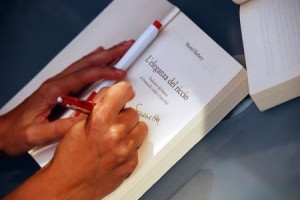
I met my Italian counterparts, the two women who had translated Paloma and Renée separately. I felt we were like three necessary shadows, basking in something we couldn’t quite understand, grateful we didn’t have to deal with autograph seekers (of which there were some) or sign several hundred copies of L’eleganza del riccio. But we were there to celebrate success, and appropriately, the food and wine and conversation were commensurate and outstanding (although I shied away from the local dish of asino—donkey meat stew.)
They were out of agnolini, but the ravioli amari were delicious. And even the waitress, as she cleared away our plates, wanted to know about the festival, the writers.
Perhaps it has something to do with the music of Italian, the beauty of the language; you breathe it, like the warm gentle air. It’s part of life. Oh, I know it’s an illusion, and it was a dream for two days, a brief glimpse of the best of all possible worlds for someone who lives and breathes words daily. Still, maybe I should brush up on my Italian.
October 12, 2008
On Nobel Prizes and Translation
 I admit, like many of my fellow translators of foreign literature who work into English, that I have often had doubts. Felt that my efforts were in vain; that apart from a few benighted yet god-sent editors and publishers, no one was reading the books I had translated. They were printed, looked lovely and readable, and then gathered dust on the shelf. Americans are fearful of foreign languages, fearful of subtitles, fearful of translations. Are they afraid to admit their own ignorance? And is it a question of their ignorance, or that of the publishers who presume American readers are resistant to translations? Are they so proud of their own authors (Roth, Oates, Pynchon, Updike, etc etc) that they don’t have time anymore for the successors to Tolstoy and Camus, who, it seems, used to be read, at least…
I admit, like many of my fellow translators of foreign literature who work into English, that I have often had doubts. Felt that my efforts were in vain; that apart from a few benighted yet god-sent editors and publishers, no one was reading the books I had translated. They were printed, looked lovely and readable, and then gathered dust on the shelf. Americans are fearful of foreign languages, fearful of subtitles, fearful of translations. Are they afraid to admit their own ignorance? And is it a question of their ignorance, or that of the publishers who presume American readers are resistant to translations? Are they so proud of their own authors (Roth, Oates, Pynchon, Updike, etc etc) that they don’t have time anymore for the successors to Tolstoy and Camus, who, it seems, used to be read, at least…
So when the Nobel Prize secretary Horace Engdahl made his now infamous remarks about Americans being isolated and insular and parochial and resistant to translation, I could only nod my head knowingly, from first-hand experience. In 1997 one of my first serious translations, Onitsha, a novel by a French author well-known in France but largely ignored in the US, was published by the University of Nebraska Press. I had read it in French, loved it, and shopped it to American publishers for three years before it finally found a home at Nebraska. It had been a bestseller in France; but it was, according to the traditional excuse of the declining US (and UK) publishers, “not for us”. And translation was “an increasingly hard sell” — obviously, if you won’t even try. Interestingly, 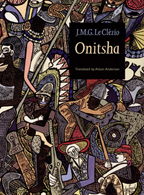 at one point an African-American publisher did nearly buy the rights. In the end Nebraska took a chance. The book did not even get any much-needed reviews, because the major papers had long stopped reviewing translations, particularly from university presses. Perhaps it was perceived as too academic or too difficult.
at one point an African-American publisher did nearly buy the rights. In the end Nebraska took a chance. The book did not even get any much-needed reviews, because the major papers had long stopped reviewing translations, particularly from university presses. Perhaps it was perceived as too academic or too difficult.
The author of the book, Jean-Marie Gustave Le Clézio, has now won the Nobel Prize for literature. There were still unsold copies of Onitsha to be dusted off in the warehouse (university presses don’t let books go “out of print” i.e. pulp them, as far as I know), but as of this writing, they may be new off the press. I hope so.
My own reaction on learning Le Clézio had been selected was, naturally, one of elation, joy, euphoria. I was visiting another publisher, in Rome, (one who, I might point out, publishes a majority of translations…) and after they gave me the news I walked out into the balmy Indian summer air on Via Camozzi with wings on my feet. It took a while for it all to sink in, to realize that the world, if not the Americans, had been following Le Clézio’s career, that my admiration for the beauty of his work had not been misplaced; simply, American publishers could not bank on his “marketability”…My own perception, as I went on to read other novels by Le Clézio, hoping to find the more “marketable” one, was that he writes, as many Europeans do, in order to convey an idea or an impression, to offer a view of the world, and that language is put to use for this purpose first and foremost, before telling a story or conveying a plot. Alas, most US publishers want the story to sell, most readers want to be entertained, and it is no longer enough for a book to be well-written for it to be read. Quality of writing without plot and likable characters is, even in English from the start, somewhat suspect, like a foreign language in its own right.
Le Clézio’s books are demanding because they ask for the reader to give in not to the story but to the language…to be lulled by its rhythms, to be carried elsewhere in order to experience the fictional world he has created — a fictional world which is always based on the real world of his own life and his own observations — as in Onitsha, which is a fictional adaptation of his journey as a small boy travelling out to Nigeria with his mother to join his father. There is no plot, per se; there is description, memory, experience.
I met Jean-Marie Le Clézio in 1997 when he was awarded the Puterbaugh Prize by the University of Oklahoma. (Another prize, less renowned, but certainly an acknowledgment of his merit and an attempt to make him known to a wider audience — clearly in Oklahoma they are not always isolated or insular, etc…). He had driven there with his wife Jamia; they were living in New Mexico at the time. The University was very hospitable, welcoming, eager to share ideas and intellectual fervour. There were seminars and receptions. This is the way things ought to be everywhere, all the time, I thought, regarding literature. I was hopeful, for the translation, which had just come out, and for my own “budding career” as a translator. I felt an elation similar to the one the other day, and it lasted for several days, as I shared words and ideas with the professors who were invited, with the conference organizers, with local dignitaries and former ambassadors, with the Le Clézios themselves. We gave a bilingual reading. We toured the university library and saw a manuscript annotated by Galileo. We talked about Wilfred 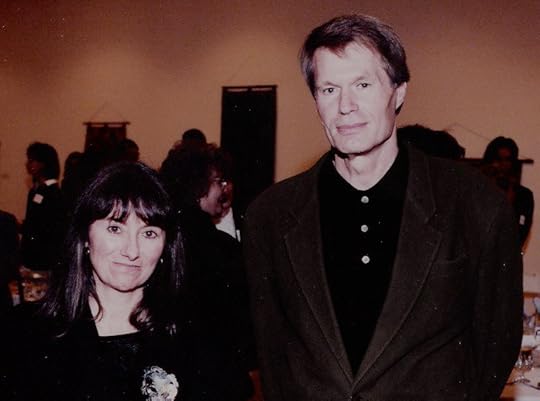 Owen. About Mauritius. About the autism of New York publishers. Above all, Jean-Marie Le Clézio said something I will never forget, and which was enough to earn my respect for a lifetime, and fuel my hope that someday he would be justly rewarded.
Owen. About Mauritius. About the autism of New York publishers. Above all, Jean-Marie Le Clézio said something I will never forget, and which was enough to earn my respect for a lifetime, and fuel my hope that someday he would be justly rewarded.
We had been talking about travel, particularly in the desert, a theme which he has often evoked. And he recalled being somewhere — perhaps New Mexico, perhaps North Africa — totally alone in the desert, on his own, able to open himself to his surroundings without fear. And he said his thoughts turned to the plight of women, and to the fear of deserted places and solitude that a woman’s condition entails, from birth. I cannot recall his exact words, but something to that effect; that a woman can never be utterly alone on the planet — as he had been in the desert — without this element of fear, or risk. For me it was proof of a great empathy — one that I have always found in his work. A consideration of how other people, who are not as fortunate, might perceive their position on earth: that we do not all belong equally, that although we are all equally entitled, some of us have less room on our small planet — women, children, immigrants, gypsies, refugees — the characters who people his novels — to live without fear or hunger.
That, in a nutshell, is for me, at least, the rationale behind the decision to attribute this year’s Nobel prize to JMG Le Clézio. An author’s ability to write exceedingly well and say something exceedingly important, that can change our view of the world. Regardless of nationality, or language, or the need for translation.
October 2008
September 12, 2008
Happy Hedgehog
 A little less than two years ago, a title caught my eye in a list of newly published novels in France. L’Elégance du hérisson. Hérisson meaning hedgehog. I’ve always had a soft spot for hedgehogs, ever since visiting my friend Christina in a remote village in Bulgaria in 1974; they had adopted a stray hedgehog. Yesh, in Bulgarian. I learned a word and an affection for an oddly repellent little animal–they prickle, and smell, and have lots of bugs; they shuffle and sniffle–and yet they are in some way tender in their awkwardness. They are fragile, vulnerable little creatures, as anyone who has driven down country roads in Britain or Turkey can attest; they are secretive, and Beatrix Potter made them lovable in The Tale of Mrs Tiggy-Winkle.
A little less than two years ago, a title caught my eye in a list of newly published novels in France. L’Elégance du hérisson. Hérisson meaning hedgehog. I’ve always had a soft spot for hedgehogs, ever since visiting my friend Christina in a remote village in Bulgaria in 1974; they had adopted a stray hedgehog. Yesh, in Bulgarian. I learned a word and an affection for an oddly repellent little animal–they prickle, and smell, and have lots of bugs; they shuffle and sniffle–and yet they are in some way tender in their awkwardness. They are fragile, vulnerable little creatures, as anyone who has driven down country roads in Britain or Turkey can attest; they are secretive, and Beatrix Potter made them lovable in The Tale of Mrs Tiggy-Winkle.
In short, I have a thing about hedgehogs. I have hedgehog stuffed animals, a keychain, a charm, a wax candle, coasters, and most recently, a hedgehog toy for my cat (he doesn’t like it that much). My daughter drew me a little hedgehog when she was a child, a tiny picture I carried in my wallet until it became too fragile and now it is framed and hangs above my bed. When I moved into my new little house in Switzerland, a hedgehog foot-wipe brush was waiting outside the front door.
So this novel intrigued me by its title. I finally got hold of a copy a few months later, and within twenty pages knew this would be, for me, the translation of a career, of a lifetime. Even if the word hedgehog only comes up once, and the book has nothing to do with hedgehogs…ostensibly. But the humor, the humanity, the quirkiness, all evoke the tenderness that the little Bulgarian yesh did so many years ago.
Read this book. Read my translation. I dare not say more, for fear of overkill, hype. Avoid the Amazon reviews, avoid any review. Please just read it. Send me your comments — on the book, on the translation. On hedgehogs.
Here is the link to the publisher’s site, for more information.
September 2008
May 10, 2008
Collateral damage…or how I keep surviving capitalism

It was one of those phone calls when you know there’s something not right. This person shouldn’t be calling you at this time of day, or on your cell phone. You answer, and to make things worse, it’s your landlady, and after a moment of annoyance that she is calling you at work, you hear her saying right up front that she has bad news.
Pick one, goes your catastrophe-panicked brain:
a) The house has burnt down.
b) She has to raise the rent, or sell, and who knows who your landlord will be then.
c) She found your kitty run over in the street.
To be honest, for me the worst was c). So when she told me that she wanted to move into my place, to save money because she couldn’t make her mortgage payments, given the current state of the US economy and variable rate mortgages, and if she moved to my little cottage she could rent her (much bigger and nicer) place and make up the difference, I was almost relieved. My cat was all right, walking indifferently over the sudden rubble of my life.
I moved into this charming little cottage just slightly over two years ago from a place where I had lived for 12 years. The longest I had ever lived in one place in my entire life. I was forced out by someone rich enough to buy a wreck of a building with an address it almost didn’t deserve, had it not been home for 30 years to one of California’s best writers, my neighbor Leonard Gardner. If we had been in another country–France, say–there might have been demonstrations or petitions to try to save the ramshackle place for Leonard’s sake. But this was America, and Marin County on top of it, where the proprietor rules, is all- powerful, and I could fill this website with all the cliches surrounding the fat man with the cigar in his mouth.
But my landlady is not a fat man with a cigar, she is a single woman struggling to keep her business going when she should be retired somewhere warm and comfortable. Her business is suffering because the entire country is “suffering”–I’m not sure I like the emotional euphemism for a decrease in purchasing power. We all suffer not for financial reasons, which vary from one person to the next, and are always extremely relative compared to, say, our neighbors south of the border; no, if we are suffering it is because these financial constraints (ah, much better word) have been placed on us by society, and we are not free.
I have been a renter all my life, hating the lack of freedom contingent with the possibility that any afternoon a landlord can give me bad news, and I become emotionally homeless once again. I have sat in rooms at parties with people who have always owned, and felt the divide between us as if it were a class barrier, (which it is, in this country) as well as a chasm in experience. No one in this country rents if they can own; rent is for transient, struggling or bohemian individuals, or the very young, or the very old–a bit like public transportation.
I rapidly took the decision to leave California and the United States, after twenty-one years. For most of those twenty-one years I have been a guest here, in my assorted sublets and apartments and cottages. For most of those twenty-one years I have wished I were elsewhere, principally back in Europe. I have kept the French language as my second home, one I own, one that I can never have taken away from me, although the barrier at parties remains, that of not sharing a language and its attendant experience and view of the world.
 In five days I will take my cat and board a plane for Charles de Gaulle, where I’ll change for Geneva, to start a new life in a neighboring town. It will be a homecoming of sorts, the exile’s return, although I will enter another sort of exile, from the English language this time. But only to a degree: English is everywhere, and will become my second home, while French will offer me shelter. I’ll be living in a place where the vast majority of people are renters; some of my friends have been living in the same apartments for thirty years. There is protection for renters, they are far less vulnerable than in the United States; landlords are corporations, insurance companies, businesses. There are no proprietary divides at dinner parties, only experiences that transcend the pull of capitalism. Not that I won’t miss California: the nature, the space, the sense of immense possibility and energy.
In five days I will take my cat and board a plane for Charles de Gaulle, where I’ll change for Geneva, to start a new life in a neighboring town. It will be a homecoming of sorts, the exile’s return, although I will enter another sort of exile, from the English language this time. But only to a degree: English is everywhere, and will become my second home, while French will offer me shelter. I’ll be living in a place where the vast majority of people are renters; some of my friends have been living in the same apartments for thirty years. There is protection for renters, they are far less vulnerable than in the United States; landlords are corporations, insurance companies, businesses. There are no proprietary divides at dinner parties, only experiences that transcend the pull of capitalism. Not that I won’t miss California: the nature, the space, the sense of immense possibility and energy.
But one grows tired of moving, of being dependent on the whims of those who have money, or not enough of it but still own property. Ultimately, my landlady has done me a favor: she is helping me to survive my own life, as it were. She will stay behind to deal with the struggling economy and her mortgage. She has already begun to tear the cottage apart, remodelling to suit her whims. It’s what you do with your money.
I think, as the plane lifts off and I look out onto the bay covered in fog on Thursday, that I will feel a new freedom, even if at the moment I don’t have a roof over my head to call my own.
May 2008

